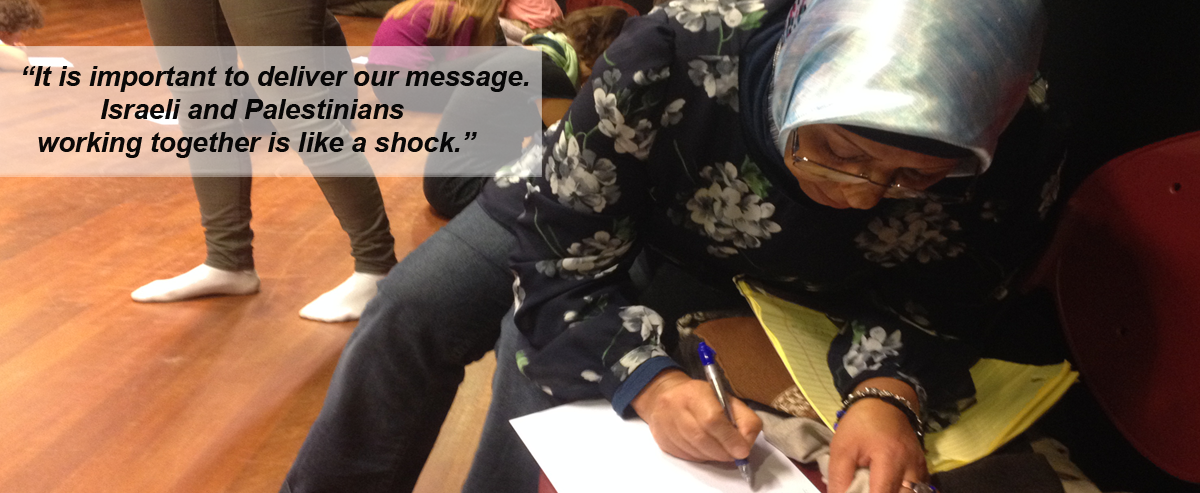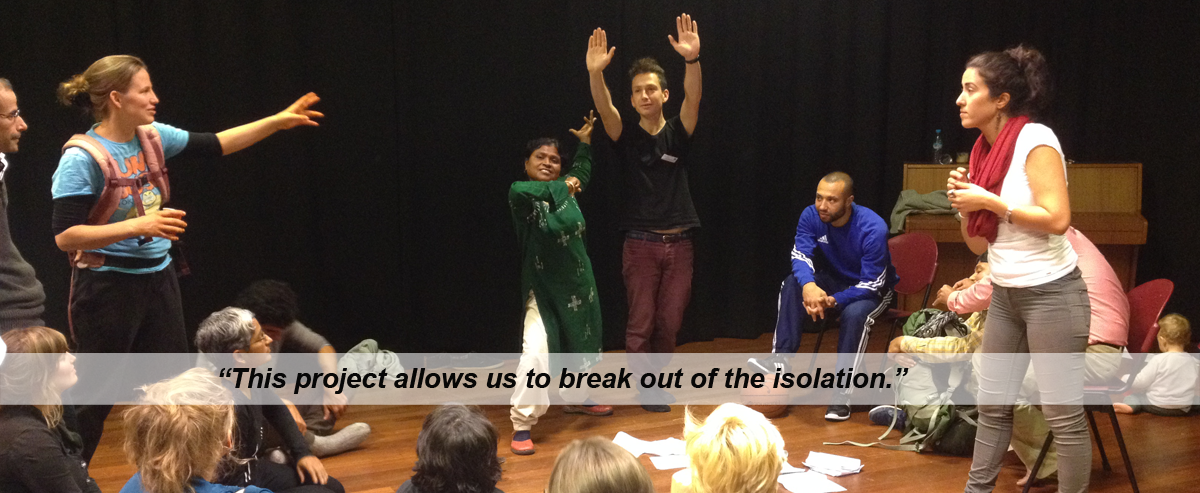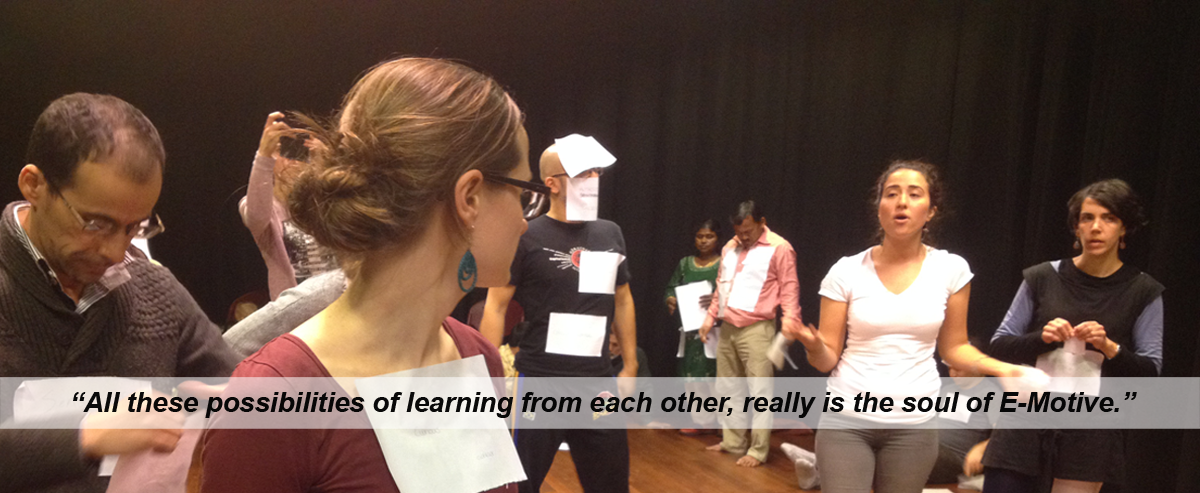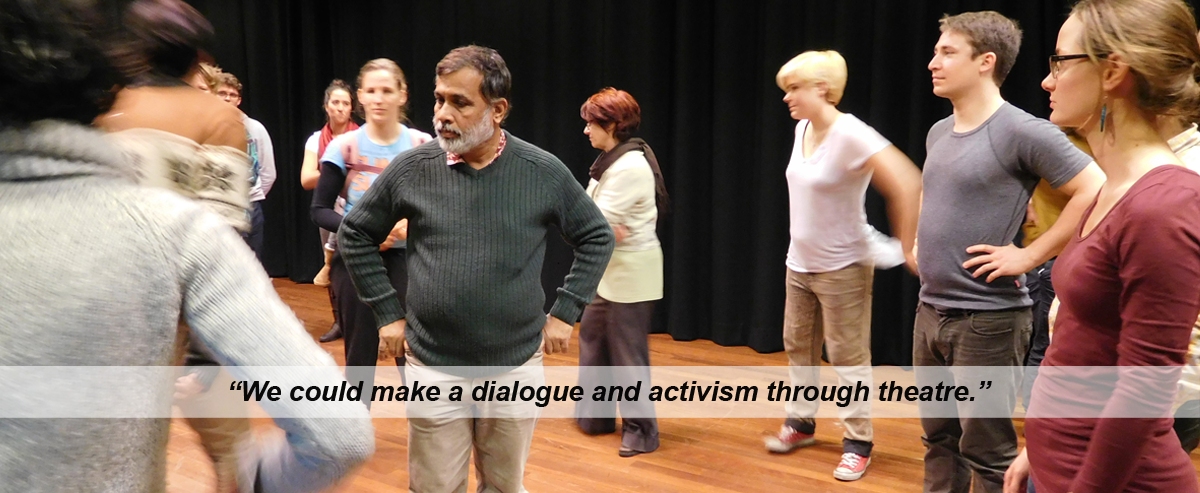Theatre allows you to see conflict situations from various perspectives
Theatre allows you to see conflict situations from various perspectives
Interview with Combatants for Peace (Chen Alon, Rima Jawabra, Maayan Rahamim) and Formaat (Luc Opdebeeck)
What is Combatants for peace?
Maayan: “Combatants for Peace is a Palestinian-Israeli activist movement in which half is Palestinian and the other half is Israeli. We founded the movement 10 years ago as a bi-national movement for dialogue, reconciliation and a non-violent struggle against the occupation. One of the 5 regional groups is a theatre group. Usually we meet once a month, sharing stories and transforming them into scenes. We are in the process of rebuilding the group and the methods of working. My vision is to make an open space inviting people to come together."
Rima: “I´m Palestinian, born in Israel, raised in a radical Palestinian family living in Israel. I joined the group because I wanted to see how you could do theatre with Israeli and Palestinians at the same time and I 'got stuck' because I understood that it was really working. We could make a dialogue and activism through theatre. I bring the voice of the Palestinian, the Israeli and the woman into the group."
How would you describe your theatre?
Mayaan: “We work with different methods, building trust and ability to listen to each other. The issues are complex. At the moment we are working mostly internally in order to build a cohesive group. The group used to work at checkpoints, the hot spots where the violence occurs. This is something we want to renew taking it to another level. You have to know how to manage the situation. Part of the privileges of theatre is, it’s not confronting soldiers violently, it opens their eyes that there´s something happening which is not dangerous and then maybe they have a chance to rethink the situation.”
What did the exchanges with different countries bring?
Rima: “It is important to deliver our message. Israeli and Palestinians working together is like a shock. Also to ask others to take part, to become active in the conflict and spread the word and have more allies. In the theatre we practice the change we want to see in the world. I learn a lot from Formaat seeing different realities we can adopt in personal aspects to feel we are equal with everyone. There are many similarities between Palestine, India and Mozambique communities, having strict laws about women etc. so it´s interesting to see how we can break the taboos. You feel like being in a big network of activism without remaining stuck in your own problems.“
How did the E-Motive exchanges improve your way of working and how do you see the future?
Chen: “First of all, we are very grateful for this opportunity. This project allows us to break out of the isolation - which lies within any conflict - , change the perspective and to understand more of the context of (any) conflict. We are two sides, protagonist-antagonist, each side feels that he or she is the protagonist. We are performing our conflict to the world, in the reality and in theatre, so here, we invite the Dutch (through Formaat) to take an active part. We transform our role from passive spectators to active actors and invite ther to do the same. It´s a space for mutual learning to understand better the nature of conflict through switching roles. One of the characteristics of the Israeli/Palestinian conflict is the hopelessness, but when we meet people around the world they see hope in our journey. When we´re interacting with other conflict zones, mostly post-conflict, we produce hope together, when we work in places like here in the Netherlands, we get a chance to exchange an amazing knowledge gained by Formaat on working on the same issues in different context. In other places we worked with ex prisoners, groups and movements, in places where the conflicts seemed to be stuck, until a certain moment when it broke through. Their people say ´why did we think it was hopeless, why couldn´t we imagine a solution?´. It´s very empowering to meet these people who have different perspectives on conflicts, sometimes from first hand experience.
Do you take these experiences and other perspectives to your own situation?
Chen: “We have learned a lot from the post peace agreement with IRA in North Ireland. They helped us to structure our vision. We have an image to look up to and to believe that one day the Israeli and Palestinians will reach its post conflict time. It seems doable when you look at places like North Ireland or South Africa. The theatre allows you to see a situation from various perspectives with various options for taking action.”
What are you going to share at the E-Motive conference in Brussels?
Luc: “What we learned during the exchange program. From my perspective, what we learned from Combatants for Peace with the polarized model about the personal transformation as a human being through theatre and how the Israel/Palestine conflict reflects on our own society. The way Muslim youth in the Netherlands identifies itself with the Palestinian cause and how actually we can use that polarised model to work with the young guys in their neighbourhood on their own identity and their community as a collective identity. This program made it possible to really embody it ourselves. This process helped us as Formaat to work on polarisation which is a hot issue here in Rotterdam. All these possibilities of learning from each other, really is the soul of E-Motive. I hope we can bring that through our stories and maybe through action.”
How do you see the future of E-Motive?
Luc: The challenge is to bring global south with global south like we do at this festival providing a safe and creative mutual space. In reality the system separates them. Here we find a space for people who deeply understand why and what we need. It creates a theatre of the oppressed and new alliances which is empowering, developing and encouraging us. Learning from each other is important. The challenge is to bring alliances also into the global south, to provide meetings between the groups. We have the sources to facilitate that. I´m so proud, that representatives from 19 different countries are attending the festival. This breeds E-Motive.
I learned a lot about the conflict of the Israeli/Palestinian conflict. Now I´m looking at this from a different angle. I no longer have a firm stand about the boycott. It is not about being a theatre company, but about being a theatre movement. There´s a big learning process within that. When you start to rehearse with homeless people and they don´t have food in their belly how can you do theatre and connect them? We realised we needed a cook because food is connecting. After the exchanges with India and Mozambique, the perspective of Formaat changed from the theatre group into the theatre movement and trying to be consequent in the changes that you make. It is about having a real human relationship. You cannot say goodbye after a project with homeless people is over. It certainly changed my vision of working with these groups like refugees, people with down syndrome and ex psychiatric patients. Now they come to the show of Jana Sanskriti. How can we say ´sorry, the funding is over´?
More about E-Motive conference 2016
More about Theatre of the oppressed




